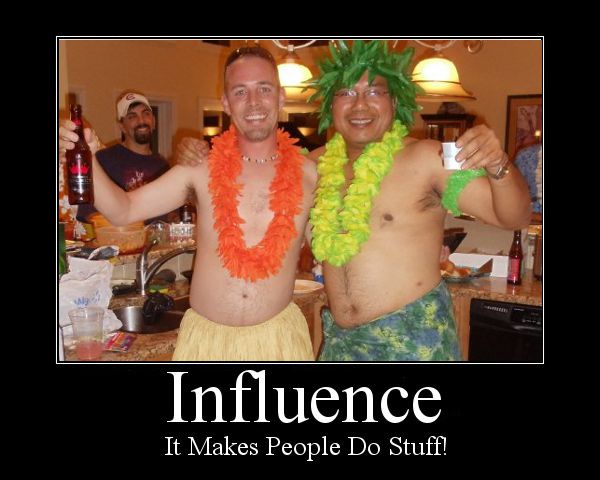
I believe the popularity addiction that many people suffer from in social media is downright pathetic. I’m going to tell you, in plain business terms, why I quit putting that drug in my bloodstream and stopped caring about appearances of popularity, having a squillion followers, or stressing about having the highest Klout score. In short, it is because those things aren’t what pays the bills, and they can even be quite destructive pursuits.
If you will look at it rationally, for just a moment, I’ll show you why the fashionable illusion of popularity fails the test of real business value. If you are ready to breathe a sigh of relief, you may want to pay attention and join me on the road to recovery.
For the most part, you probably don’t follow people on Twitter or “Like” them on Facebook because you’re planning to do business with them. Sometimes, perhaps, but how often? Really, how often do you use that long list of people you are connected to as a reminder for your shopping list?
When you need to pick up something on your next shopping venture, you don’t go and see who you’re following to decide what to buy or who to buy from. No you don’t! OK, maybe you do … but if that’s the case, you are in a very small minority. If you buy from them, it is likely because they built a positive brand image, and became more memorable.
Then why is it that so many people out to sell something have it in their head that other people are using social media for formulating their shopping list? They aren’t thinking in rational human terms … that’s why! They are thinking in terms of appearances and what may make them look more important or popular, rather than building a sustainable brand recognition. I guess that must make sense to some people, but not the successful ones … not for the ones with two brain cells to rub together.
Let me explain it like this: If you saw only 426 people following Subway Restaurants on Twitter, it probably wouldn’t alter your thoughts about buying a Subway sandwich. You buy from them because they make an awesome sandwich, and you’ve heard of them because they built their brand based on those awesome sandwiches. That is also why they don’t have 426 Twitter followers … they have 184,847. They produced something people want, and they made it memorable.
Conversely, if you see that a small real estate firm has 184,847 Facebook fans, it doesn’t mean they’ve got a house you want … or that they will be any better at selling your house. In fact, it may mean they are playing the popularity game, and prioritizing poorly.

You can lie to me, but don’t lie to yourself. If you try lying to me, I’ll break out the real numbers. Try this on for size: Here is a recent snapshot of a random hundred people who followed me on Twitter, along with the results I put together from over 1,000 tweets of my previous ten blog articles. See “Twitter in Numbers: Marginal, Not Magical“. Click it and read up if you really want the truth.
Perhaps too many people latched onto the fallacy of “more is better”, or the crazy idea that social media marketing is just about the networking … but it’s not!
The Psychology of Social Media Popularity
Nobody is fully immune to the notion that a perception of popularity will somehow serve them. I’ve even heard it from people who have absolutely no business case to have a big audience. When I have asked people about it, they are often confused by why I think it is unimportant. A small number of them are honest enough to admit that they want the popularity because it makes them feel good … and it makes them feel more productive, or more important.
In itself, a Twitter follower or a Facebook fan or friend is a terribly weak way to measure your brand’s love, but I see it all the time. I have heard many instances of companies wanting to know how much it will cost to acquire “X” number of friends, fans, followers, and other useless measures. A much smaller number is asking how to breathe awesomeness into their brand and earn faithful brand advocates and customers.
Something those who participate in the popularity contest are reluctant to admit is that more social media connections alone does not actually equal true popularity, or value. What it can do, however, is make them feel like they are making progress, even when there is no true progress at all. It often just means those connections had the same psychological need for validation, and they are participating in the absurdity of implied reciprocity. These people are completely confusing cause and affect, and they are wasting precious resources, like time and money.
The hope is often to have hundreds of people tweeting and facebooking something about them. That is a different kind of popularity, and it means your message is spreading. I don’t begrudge anybody for that, and I won’t call them a fool. In fact, it is just great! That may actually have value, and it may land the right person to become a customer. It is a sign of doing something well. That kind of popularity is often due to legitimate reasons.
Look at how you use social media, and then consider why you think everybody else is so different. Unless you are doing something totally different, and awesome, it really seems arrogant to believe that they are paying more attention to you than you are them.

You may find a number of people or companies that you find interesting, but don’t tell me for a second that you found thousands of people you really intend to keep up with and give attention to what they have to say. It simply doesn’t work that way. Have you ever heard of Dunbar’s Number? It works both ways, and unless those people are really interested in you, it is worthless. For the truth, just picture yourself as one of those random names or faces you see as you look at who you are “following” or “liking”. Do you really pay attention to them? Do you really think they are paying attention to you?
The Little Company That Couldn’t
I want you to imagine the little company who couldn’t. They set out to find popularity, and they paid a “social media expert” to help them amass an audience, but they wanted it done quickly and at a low cost. The social media expert could be blamed (and should rightfully be hung by the short hairs) for delivering them a group of totally disinterested people to follow them on Twitter and “Like” their Facebook page. The thing is, it is exactly what the company asked for, and they refused to see it any other way. It was what they were sure would work, and it was all they were striving for. They dictated exactly what they wanted, and now they’ve got an untargeted audience.
Months later, they wonder why they are still not seeing a return on their social media investment. They have a huge audience, but those people just aren’t rushing the gates to buy their stuff. It is often because they were too concerned by the cost of time, money, and hard work that they never questioned the return. As the company resentfully struggles with “What in the heck is wrong with those people?!”, the competition is doing great.
The competition saw the value of a strategy, and they stopped trying to be like everybody else. The competition realized that having a disinterested group of people to follow them, “Like” them, and pad their egotistical desires for appearance without substance will not be worth a box of frog toenails if they are the wrong audience.
Here’s My Theory on The Value of Popularity
I guess should know a little about this … I have a metric squillion readers of my blog, and a reasonably sizable following across my social networks. I don’t need, nor want everybody to like me, love me, or follow me. I don’t concern myself with a bigger audience, because I would rather focus on the right people, and give them something they want … something useful. That’s why the audience is there in the first place!
Without a focus on people’s interests, and doing something worthwhile, it has very little business value. I guess you could say that I am reasonably popular, but I am still working on the awesome factor, every day. That matters a whole lot more to my business and personal pursuits than just looking popular.
Even with a great audience, it still requires a lot of effort. The most valuable audience is often the smallest target of all.
No, not at all. I reach my best audience by creating something valuable enough to you that you feel confident to pick up the phone and call me, recommend me to your CEO as a consultant on your next marketing campaign, share my knowledge with somebody else who will find it useful, or otherwise appreciate my work enough that you help the right clients find me. That is real social media business (as opposed to monkey business), and it is far more important to me than a popularity contest.
That’s my take on the subject. What do you have to say about it?
Photo Credits:
Heroin and Syringe by Michael Velardo via Flickr
“Red Face” sells? by Daniel Axelson via Flickr
Héroïne by Alexandre Duret-Lutz via Flickr
Podcast: Play in new window | Download





